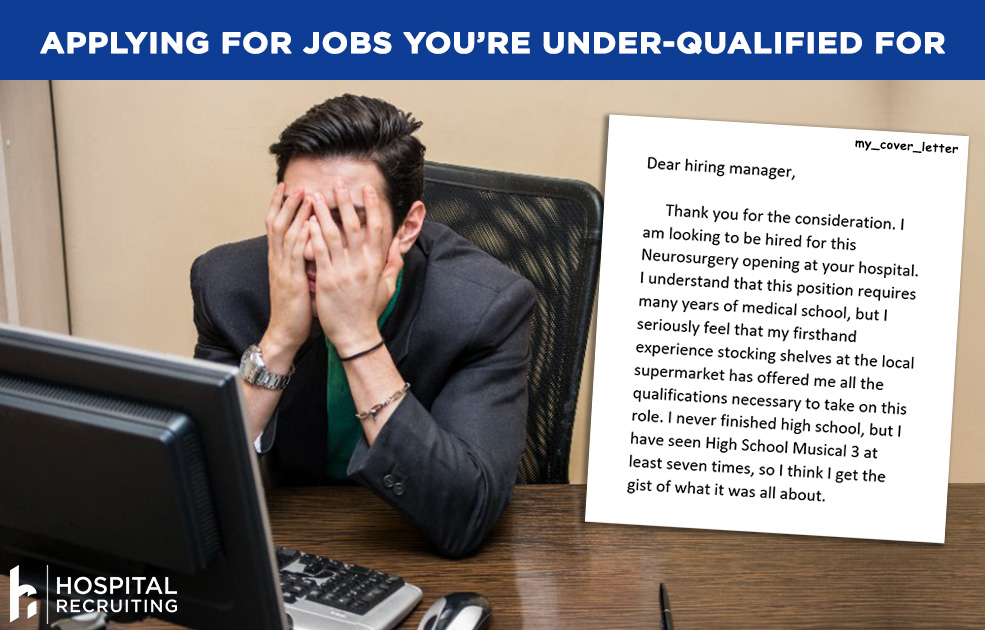
Should you apply for positions that you are not completely qualified for? This is a question that many job seekers struggle with. On the one hand, you do not want to sell yourself short and miss an opportunity to advance your career. On the other hand, you don’t want to waste your time applying for jobs that you would never be considered for anyways.
Ultimately, when considering a job you are not fully qualified for, it really depends on the specific situation. Employers almost never make every requirement hard and fast. However, there are some requirements that cannot be flexible. Additionally, there are ways that you can enhance your chances of being accepted for these positions. By taking into consideration some basic principles, you can optimize the likelihood of getting a position that seems above your qualifications.
Don’t Assume It Is Completely Necessary to Meet All Requirements
Every employer and job posting are different, but it is not typically necessary to meet 100% of every job requirement. That being said, if you only meet 10% of the requirements, your chances are very, very slim. Many experts agree that a good rule of thumb is that you meet about 80% of the requirements in a job posting if you are thinking about applying.
When considering jobs that you are under-qualified for, you should recognize how you are under-qualified. This involves seeing what areas you do not fully meet and evaluating if you could still be considered. If the job requires that you have a degree as a medical doctor and you only have a bachelor’s degree, for example, you are very unlikely to be considered. If a job requires eight years of management experience, however, and you only have four, this may not be as much of a deal-breaker.
Be Sure You Could Actually Do the Job
While employers may not rigidly hold to every job requirement when actually choosing an employee, those requirements are listed for a reason. The one thing worse than not being able to get a job that you are under-qualified for is getting a job that you are under-qualified for and are actually unable to do well.
When considering a job that you are under-qualified for, be sure to think through what would happen if you actually got the job. You may have to put some extra time and effort into getting up to speed with the job in order to meet the expectations of a new position and will need to be sure that you are prepared for the extra work you will encounter.
Be Ready to Explain Why You Should Be Considered
If you are applying for a position that you are under-qualified for, you should be able to explain why they should consider you, even though you don’t meet all their qualifications. You should explain this in your cover letter and anywhere else in the application that affords the opportunity. You should also be prepared to discuss this in your interview.
Your explanation should be as convincing as possible. For example, if the job description requires management experience and you do not have actual professional experience managing but have a similar experience coordinating a volunteer program, for example, you should explain your similar experience and how it relates.
Keep in mind that explaining why you should be considered doesn’t always have to include specific examples of things you have done in the past. Sincerely and passionately explaining that you know you don’t have the experience that they are looking for but that you have the drive and determination to do what it takes to be a success and add value can often be convincing.
Leverage Connections Within Your Network
When applying for jobs that you are under-qualified for, having the right connections can help. Not only can connections help you to be considered for jobs that you might otherwise not be, but they can also help you to understand what jobs you should apply to, even though you don’t meet all the qualifications and which ones won’t be a good use of your time to apply to.
An important consideration when connecting with people from your network about jobs that you are under-qualified for is that they may know that you won’t be a good fit for specific positions. Be tactful and pay attention if they are trying to discourage you from applying to a position. In these situations, the professional thing to do is to give your contact an out so that they do not feel pressured to help connect you with a job for which you are not a good candidate.
Be Okay With Rejection
Being rejected is part of applying for jobs; however, you are statistically more likely to be rejected when applying for positions that you are under-qualified for. It is important to understand that many of the hiring managers in these positions will go with well-qualified applicants, regardless of how passionately you describe your willingness to work hard and learn quickly.
Hiring managers don’t know you, they don’t know what you are capable of, and they, unfortunately, cannot learn about your passion and ability to grow from an application or even an interview. Before applying to jobs that you are under-qualified for, it is best to prepare yourself for being turned down, as this can happen more frequently.
Ultimately, applying for jobs you are under-qualified for may be more difficult and require more work to land. However, the potential rewards from putting in this extra effort can be well worth it.
